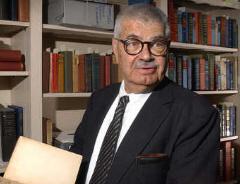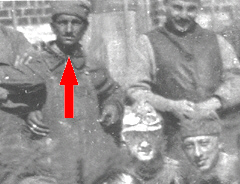I made a new friend this past March and lost him by June. He was Professor Matthew Bruccoli of the University of South Carolina, the world's leading authority on F. Scott Fitzgerald and the other authors of the Lost Generation. It was his work on the First World War, however, that led me to call him at his office one day — I wanted to interview him about the series of WWI literary classics that is being reissued by his university's press under his guidance and about his two vast collections of publications, memorabilia, and art from the war. I suspected the key to his enthusiasm for studying the war was the fact that all his projects are dedicated to the memory of his father Joseph, a veteran of the AEF, but I wanted to confirm this and learn more about the professor's projects.
After introductions and outlining my initial questions — the sources of his interest in the war, his father's military experience, the literary impact of the war — the professor, whom I immediately read as being of the "gruff" personality type that does not suffer fools one iota, responded comprehensively. He held forth with passion, humor, and enormous pride on all the topics I raised and on some I should have raised. He was both scathing and hilarious when I asked him how a patriot like himself got along in an academia now dominated by people hostile to American traditions and position in the world. Believe me, after hearing about his many battles in the halls of academe, it was clear to me that he taken on all comers in those struggles for 40 years with glee and, I believe, with great success.
The key — as I anticipated — to all of his effort to encourage study and scholarship on the war was really his father, and what I learned about him was fascinating. When Joseph Bruccoli was called to arms in 1917 he happened to bring along a unique skill. He could drive the difficult-to-learn Pierce-Arrow truck of the era, of the type that was being sold to the French Army. So he was detailed to a group of Doughboys assigned to drive for the French forces, bringing supplies to the front line in every zone on the Western Front. This proved extremely hazardous for Joseph, who returned from the war wounded, shell-shocked, and with eight campaign badges. Despite his rough period of service, though, he found the war had intensified his love and admiration for his country and especially those who served in her military. He passed these values on to his son Matthew, who was born at the height of the Depression. I found the respect and love that Matt expressed for his dad admirable and touching.
Our further conversation involved a lot of discussion about the literature of the war, which I won't get into here, but I strongly recommend the series of books Matt selected for the university press to re-issue: (Link). At some point in our chat, however, some floodgate opened — we each realized we were dealing with kindred souls. He was excited to discover that I led tours to the battlefields and asked me to design and lead a tour for himself and a group of students next year. Then, we talked about my magazine OVER THE TOP, and he was particularly happy to hear we had published James M. Cain's "The Taking of Montfaucon", which he considers one of the best stories to come out of the First World War. Spontaneously, he offered a war story by Thomas Wolfe from his collection for publishing in my magazine [which I did.] After two hours, or so, he had other matters to attend to, but we agreed to talk again when I returned from my spring trip to the Western Front. I looked forward to our future collaboration. Less than a week after our chat, I received a whole box of material from Matt, copies of all the books in the series published thus far, the Thomas Wolfe story, material from the Great War archives named after his dad, and a list of places he wanted to visit with his students on the forthcoming trip to France.
I got back from Europe in mid-June and had a lot of catching-up to manage, having been away for over two weeks. On my to-do list, though, was renewing contact with the professor. You can imagine the shock I felt, then, when one of our readers sent me the announcement that Matthew Bruccoli had died of a brain tumor on 4 June. Apparently, he learned of his illness only a month before, so Matt went fairly quickly. His passing was a big loss both for American literature and for students of the Great War. For me, it was personal blow. Our direct contact had lasted no more than 120 minutes, but I really liked that man and looked forward to working with him. MH
| ||||




What a great story, Mike. Thanks for reprinting. I knew his work as the leading Fitzgerald scholar but did not know about his father's experience and how that inspired him.
ReplyDeleteMike, thanks for sharing...and hopefully easing the shock.
ReplyDeleteI look forward to learning more about the Bruccoli collection and reading books on his suggested list.
Mike:
ReplyDeleteThanks for this story.